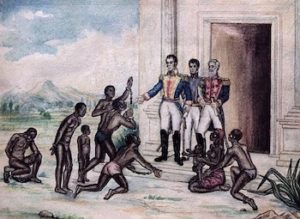
*Abolitionism in South America is celebrated on this date in 1500.
The Valladolid debate (1550–1551) was the first moral debate in European history to discuss the rights and treatment of indigenous people by European colonizers. Held in the Colegio de San Gregorio, in the Spanish city of Valladolid, it was a moral and theological debate about the conquest of the Americas, its justification for the conversion to Catholicism, and more specifically, the relations between the European settlers and the natives of the New World. It consisted of opposing views about how natives would be integrated into Spanish society, their conversion to Catholicism, and their rights.
Bartolomé de las Casas was a 16th-century Spanish Dominican priest, the first resident Bishop of Chiapas (Central America, today Mexico). As a settler in the New World, he witnessed and opposed the poor treatment and virtual slavery of the Native Americans by the Spanish colonists under the encomienda system. He advocated before King Charles V, Holy Roman Emperor, on behalf of rights for the natives. Las Casas, for 20 years, worked to get African slaves imported to replace natives; African slavery was everywhere, and no one talked of ridding the New World of it, though France had abolished slavery in France itself, and there was talk in other countries about doing the same. In fact, from a purely economic point of view, Africans were better slaves, stronger and healthier, because the "Middle Passage had been selected for these traits." Bartolomé de las Casas.
However, Las Casas had a late change of heart and became an advocate for the Africans in the colonies. Bartolomé de las Casas’ book, A Short Account of the Destruction of the Indies, contributed to the Spanish passage of colonial legislation known as the New Laws of 1542, which abolished native slavery for the first time in European colonial history. It ultimately led to the Valladolid debate, the first European debate about the rights of colonized people. During the early 19th century, slavery expanded rapidly in Brazil, Cuba, and the United States. Simultaneously, the new republics of mainland Spanish America became committed to the gradual abolition of slavery.
During the Spanish-American wars for independence (1810–1826), slavery was abolished in most of Latin America, though it continued until 1873 in Puerto Rico, 1886 in Cuba, and 1888 in Brazil. Chile declared freedom of wombs in 1811, followed by the United Provinces of the River Plate in 1813, Colombia, and Venezuela in 1821, but without abolishing slavery completely. While Chile abolished slavery in 1823, Argentina signed the Argentine Constitution of 1853. Peru abolished slavery in 1854. Colombia abolished slavery in 1851. Slavery was abolished in Uruguay during the Guerra Grande by both the government of Fructuoso Rivera and the government in exile of Manuel Oribe.